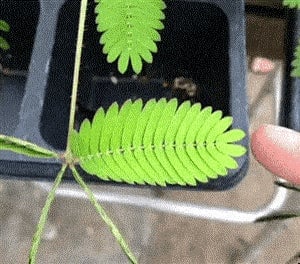Plants can feel you touching them—and sometimes they don’t like it
Scientists already know that plants are highly sensitive to touch of any kind, and even have a word for this phenomenon, “thigmomorphogenesis.” If you’ve ever touched a Mimosa pudica (also known as the “sensitive plant”) you have already witnessed this phenomenon first hand—the Mimosa’s fan-like leaves close up like, well, an old-school handheld fan.


Scientists already know that plants are highly sensitive to touch of any kind, and even have a word for this phenomenon, “thigmomorphogenesis.” If you’ve ever touched a Mimosa pudica (also known as the “sensitive plant”) you have already witnessed this phenomenon first hand—the Mimosa’s fan-like leaves close up like, well, an old-school handheld fan.

But most of the time, the effect is not visible. Or not immediately visible. A paper published earlier this month (Dec. 8) in the Plant Journal found that touching plants triggers such a dramatic response in their hormones and gene expression that it could substantially inhibit their growth.
The team stroked thale cress (Arabidopsis thaliana), a weedy plant in the mustard family, with soft paint brushes, and then analyzed the plants’ biological responses.
“The lightest touch from a human, animal, insect, or even plants touching each other in the wind, triggers a huge gene response in the plant,” Jim Whelan, a biologist at La Trobe University in Australia and an author on the study, said in a statement. “Within 30 minutes of being touched, 10% of the plant’s genome is altered.”
A plant can’t flee threats, unlike mobile organisms. Instead, they have a highly sensitive threat-response system—like a plant’s version of an immune system. Prior research has suggested that touch could actually be beneficial, because it stimulates the plant immune system. In one study, human touch helped plants ward off a fungus.
But this study found that the plants used a lot of resources to respond to touch, which are then not available for growing; the researchers found if they touched a plant multiple times, that was enough to reduce its growth rate by as much as 30%. Other papers have similarly shown that touch can change plant growth; a paper released in 2016 found that even a gentle pat could change the expression of thousands of genes within the same plant.
“While plants don’t appear to complain when we pinch a flower, step on them, or just brush by them while going for a walk, they are fully aware of this contact and are rapidly responding to our treatment of them,” Olivier Van Aken, a plant biologist at the University of Western Australia and lead author of the 2016 paper, said at the time.
Whelan and his team uncovered more information about the genetic pathways that are activated by touching a plant, which may be useful for developing more resilient plants. Whelan told the Sydney Morning Herald that the findings are likely most useful to the agriculture industry: if plant geneticists can find ways to alter that defensive response, produce yields could potentially go up.
Regardless of the specific cascade of effects that come when a plant is touched, the fact remains that they do feel it. It’s yet another area of research raising the question of what it means to be conscious—and whether plant “consciousness” should be included in that category. Already, researchers have found that plants can “hear” water and other sounds in their environment, and can communicate with each other by way of chemical signaling. Plants can also learn.